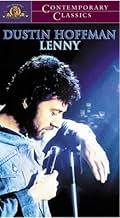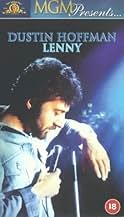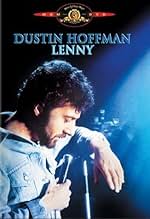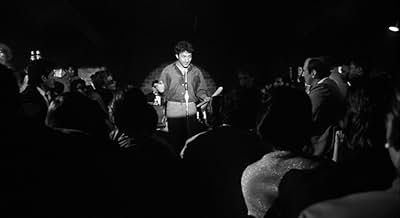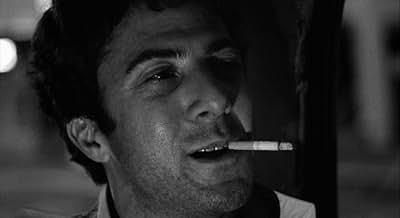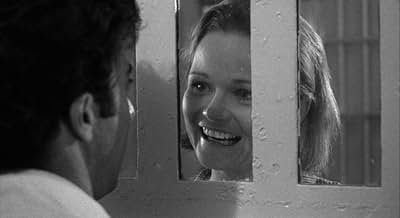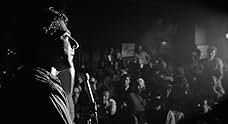CALIFICACIÓN DE IMDb
7.5/10
19 k
TU CALIFICACIÓN
La historia del cómico de los 60 Lenny Bruce, cuyo estilo de comentario social rompió barreras y fue considerado, en su momento, como demasiado obsceno para el público.La historia del cómico de los 60 Lenny Bruce, cuyo estilo de comentario social rompió barreras y fue considerado, en su momento, como demasiado obsceno para el público.La historia del cómico de los 60 Lenny Bruce, cuyo estilo de comentario social rompió barreras y fue considerado, en su momento, como demasiado obsceno para el público.
- Nominado a 6 premios Óscar
- 7 premios ganados y 17 nominaciones en total
Kathryn Witt
- Girl
- (as Kathie Witt)
Monroe Myers
- Hawaiian Judge
- (as Monroe Meyers)
Opiniones destacadas
As long as I can remember, I've been a massive fan of stand-up comedy. I think that these days there are very few comedians who are worth their weight, but the joy of watching the few who are is almost unparalleled. It's no secret that Lenny Bruce changed the face of stand-up, becoming a pioneer for such contemporaries as Louis C.K. and Bill Burr, my two favorite comedians. Bruce came into a world that was scared to speak the truth, scared to laugh at the absurdity of human behavior and he held up a mirror to the world and said, "Look at yourself, aren't you ridiculous?".
For it's time, the idea of doing this was shocking and wildly controversial. People saw him as vulgar and offensive, when he was really just speaking the truth that people were afraid to here. He evolved the game and it's only fair that an actor like Dustin Hoffman, a fellow pioneer of his career field, was selected to portray Bruce in this stark and honest biographic tale. My general stance towards Hollywood biopics is that I'm strongly against them, believing that to condense the life of a human being into a two or three hour film is impossible, but the script here by Julian Barry, adapting from his own play, does a strong job of taking the important parts of Bruce's life and leaving the rest behind.
Unfortunately it does fall into a lazy trap of this genre, using a structure that functions around post-death interviews with those closest to Bruce in order to tell the story of his rise and fall. What's interesting though is that it doesn't play it straight in the sense of going back and forth between post-death and the chronological rise of Bruce; it does do this, but it also throws in another period, Bruce's last routine on stage. This adds an interesting twist onto this worn out structure and makes watching his rise even more intriguing to witness.
We see him on stage, miraculously portrayed by Hoffman, with a full beard, exhausted expression and a wild, kinetic energy; a refusal to give up and sit down, an almost desperate need to get out all of the words he needs to say before he is stopped again. Bruce is almost a protester here, grabbing his microphone and shouting towards anyone who will listen to understand the crimes against humanity that are being permitted every day. Seeing him in this state makes it even more interesting to see where he began, as we now must wonder what happens to turn the nebbish and soft Bruce we meet in his earliest time period into the biting and confident man he will later become.
Bob Fosse directs it all with his own unique flare, and some razor-sharp editing keeps things feeling fresh and as kinetic as the man the whole thing is based around. I also want to mention the cinematography, which is honestly some of the best I've ever come across. It's presented in black and white, which was a wonderful idea to match Bruce's style as a performer, and the way that the shots are composed and lit is a visual orgasm in every way. This is one of those films that I wanted to pause every five seconds just to marvel at the way it was shot, but I couldn't allow myself to step away from seeing more of Bruce.
Everyone in the cast and crew do marvelous work here, but there's no denying that the film belongs to one man and that man is Dustin Hoffman. His performance is one of titanic proportions here, a slow-burn of pure genius, bringing Bruce along that evolutionary path to the man we know he will one day become. Lenny Bruce goes through many stages before he becomes the comedic icon that we initially see, and Hoffman plays them all with an absorbed authenticity that is purely magical. Looking back in time we see when he first meets his future wife Honey, and the utter bliss and childish joy on his face would be beautiful if it wasn't so heartbreaking knowing what he will eventually become.
It's in the later stages that Hoffman truly lifts off though, when Bruce is in and out of prison and struggling with a drug addiction. Bruce becomes a bastion for free speech and social commentary, but more the film presents him as something more human than that; a flawed creature who for all of his evolutionary changes to media was also a very broken man within himself. There is a scene where Bruce does a routine wearing nothing but a raincoat and one sock, while he's riding high on drugs, that might just be the finest piece of acting I've seen my entire life.
The scene is about ten minutes long, but it feels like it lasts an eternity. Normally this would be a complaint, but here it couldn't be a stronger compliment, as Hoffman takes us through this horrific state that the man is in at the time. With his lapses in silence, his rambling dialogues and his stop and start speech patterns, it's like watching a train wreck that you can't stare away from and you just keep hoping will be over soon. You want it to stop but you know that you aren't going to look away until it does.
This colossal feat of acting would be impressive on it's own, but the fact that Hoffman does all of it in one take makes it something truly out of this world. It's a performance that stands at the very top of the all-time greats, in a film that is as brutally honest towards Lenny Bruce as he was towards the rest of the world.
For it's time, the idea of doing this was shocking and wildly controversial. People saw him as vulgar and offensive, when he was really just speaking the truth that people were afraid to here. He evolved the game and it's only fair that an actor like Dustin Hoffman, a fellow pioneer of his career field, was selected to portray Bruce in this stark and honest biographic tale. My general stance towards Hollywood biopics is that I'm strongly against them, believing that to condense the life of a human being into a two or three hour film is impossible, but the script here by Julian Barry, adapting from his own play, does a strong job of taking the important parts of Bruce's life and leaving the rest behind.
Unfortunately it does fall into a lazy trap of this genre, using a structure that functions around post-death interviews with those closest to Bruce in order to tell the story of his rise and fall. What's interesting though is that it doesn't play it straight in the sense of going back and forth between post-death and the chronological rise of Bruce; it does do this, but it also throws in another period, Bruce's last routine on stage. This adds an interesting twist onto this worn out structure and makes watching his rise even more intriguing to witness.
We see him on stage, miraculously portrayed by Hoffman, with a full beard, exhausted expression and a wild, kinetic energy; a refusal to give up and sit down, an almost desperate need to get out all of the words he needs to say before he is stopped again. Bruce is almost a protester here, grabbing his microphone and shouting towards anyone who will listen to understand the crimes against humanity that are being permitted every day. Seeing him in this state makes it even more interesting to see where he began, as we now must wonder what happens to turn the nebbish and soft Bruce we meet in his earliest time period into the biting and confident man he will later become.
Bob Fosse directs it all with his own unique flare, and some razor-sharp editing keeps things feeling fresh and as kinetic as the man the whole thing is based around. I also want to mention the cinematography, which is honestly some of the best I've ever come across. It's presented in black and white, which was a wonderful idea to match Bruce's style as a performer, and the way that the shots are composed and lit is a visual orgasm in every way. This is one of those films that I wanted to pause every five seconds just to marvel at the way it was shot, but I couldn't allow myself to step away from seeing more of Bruce.
Everyone in the cast and crew do marvelous work here, but there's no denying that the film belongs to one man and that man is Dustin Hoffman. His performance is one of titanic proportions here, a slow-burn of pure genius, bringing Bruce along that evolutionary path to the man we know he will one day become. Lenny Bruce goes through many stages before he becomes the comedic icon that we initially see, and Hoffman plays them all with an absorbed authenticity that is purely magical. Looking back in time we see when he first meets his future wife Honey, and the utter bliss and childish joy on his face would be beautiful if it wasn't so heartbreaking knowing what he will eventually become.
It's in the later stages that Hoffman truly lifts off though, when Bruce is in and out of prison and struggling with a drug addiction. Bruce becomes a bastion for free speech and social commentary, but more the film presents him as something more human than that; a flawed creature who for all of his evolutionary changes to media was also a very broken man within himself. There is a scene where Bruce does a routine wearing nothing but a raincoat and one sock, while he's riding high on drugs, that might just be the finest piece of acting I've seen my entire life.
The scene is about ten minutes long, but it feels like it lasts an eternity. Normally this would be a complaint, but here it couldn't be a stronger compliment, as Hoffman takes us through this horrific state that the man is in at the time. With his lapses in silence, his rambling dialogues and his stop and start speech patterns, it's like watching a train wreck that you can't stare away from and you just keep hoping will be over soon. You want it to stop but you know that you aren't going to look away until it does.
This colossal feat of acting would be impressive on it's own, but the fact that Hoffman does all of it in one take makes it something truly out of this world. It's a performance that stands at the very top of the all-time greats, in a film that is as brutally honest towards Lenny Bruce as he was towards the rest of the world.
... because I watched this yesterday for the first time in years, and I was less impressed than I was when I saw it in the early 80s. That's probably because I've been binging on The Marvelous Mrs. Maisel and thus have seen Luke Kirby's interpretation. Allowed to be spread out over several seasons, episodes, and situations, I just feel it is a more complete performance. But I digress.
Lenny starts out trying to do bits like any other comic of the day - the early 50s, and he fails at it. He then starts to do more commentary on the human condition as stand-up, and that's where he hits his mark. Especially at a time of great societal change like the late 50s/early 60s. Today, that's the stuff of pretty much all stand-up comics, so it's hard to appreciate just how ground-breaking it was at the time. It's like trying to appreciate how ground-breaking "Citizen Kane" was in 1941. It's still an interesting film, but it's just impossible to appreciate it as next-level filmmaking like it was at the time.
My big takeaway was that director Bob Fosse really knows how to tell a story with editing. There are sequences in all of his movies where I would say, 'Wow,' just to an editing choice. Lenny impressed me the most in that regard. As for Valerie Perrine as Lenny's wife - I think that had she been up for Best Supporting Actress Oscar instead of Best Actress, she would have won that category. She was striking as a woman who went along with the choices that her husband made for the both of them with not much if any input from her, and later got blamed by him and society for that matter for going along with those choices. In that regard, she was a more conventional wife of the 1950s than you would think.
Lenny starts out trying to do bits like any other comic of the day - the early 50s, and he fails at it. He then starts to do more commentary on the human condition as stand-up, and that's where he hits his mark. Especially at a time of great societal change like the late 50s/early 60s. Today, that's the stuff of pretty much all stand-up comics, so it's hard to appreciate just how ground-breaking it was at the time. It's like trying to appreciate how ground-breaking "Citizen Kane" was in 1941. It's still an interesting film, but it's just impossible to appreciate it as next-level filmmaking like it was at the time.
My big takeaway was that director Bob Fosse really knows how to tell a story with editing. There are sequences in all of his movies where I would say, 'Wow,' just to an editing choice. Lenny impressed me the most in that regard. As for Valerie Perrine as Lenny's wife - I think that had she been up for Best Supporting Actress Oscar instead of Best Actress, she would have won that category. She was striking as a woman who went along with the choices that her husband made for the both of them with not much if any input from her, and later got blamed by him and society for that matter for going along with those choices. In that regard, she was a more conventional wife of the 1950s than you would think.
I saw this film during it's initial release in the theaters but have only seen it twice since then. It didn't get much of a TV life. Dustin Hoffman is stellar as social commentary/satirist/observationalist/blue language comic Lenny Bruce. He was nominated for Best Actor for the 1974 Academy Award for his role but lost out to Art Carney for Harry and Tonto. Veteran actor Albert Finney was also nominated that year but Carney won on sentiment and Hoffman lost out when he and fellow nominees Jack Nicholson for Chinatown and Al Pacino for Godfather II split the vote which led to Carney's win. Valerie Perrine in her only Oscar nomination of her career was up for Best Actress. Lenny was up for most of the major awards including Best Picture, Best Director for Bob Fosse. It was also nominated for Best Screenplay and Cinematography but came up empty in all six nominations. Hoffman had just come off playing another biographical figure of Louis Dega in Pappion and would be Carl Bernstein in his his next film All the President's Men. Lenny Bruce had only been dead for eight years when Hoffman portrayed him on the big screen so much of the audience knew Bruce fairly fresh in their memories so to portray a contemporary figure of Bruce's genius and legend was not an easy role for Hoffman to step into but his portrayal of the doomed and controversial comic is compelling. Fosse, known for his choreography which is still being used in films like Chicago years after his death only directed five theatrical films and three of those were musicals in Sweet Charity, Caberet and All That Jazz so Lenny would be the first of only two non-musicals he would direct, both biographies, Lenny and Star 80. I don't think as a film this had enough to be a best picture but Hoffman was deserved of his best actor nomination and arguably should have won the Oscar for it. I would give this an 8.5 out of 10 and recommend it.
A tribute to ground-breaking comedian Lenny Bruce and - another - absolutely breathtaking performance by Dustin Hoffman (and, as is typical for that period of filmmaking, pretty much everyone of the cast).
When seventies cinema was good, it was really, really good, and it is, at least acting-wise, only rarely rivaled in contemporary productions. As a character study and also as a snap shot of an era, 'Lenny' is essential viewing. 8 stars out of 10.
In case you're interested in more underrated masterpieces, here's some of my favorites:
imdb.com/list/ls070242495
When seventies cinema was good, it was really, really good, and it is, at least acting-wise, only rarely rivaled in contemporary productions. As a character study and also as a snap shot of an era, 'Lenny' is essential viewing. 8 stars out of 10.
In case you're interested in more underrated masterpieces, here's some of my favorites:
imdb.com/list/ls070242495
The life of late stand-up comedian Lenny Bruce (played by Oscar-nominee Dustin Hoffman) is the focus of "Lenny", a dark and disturbing staircase of horrors from director Bob Fosse (Oscar-nominated). In the late-1950s and early-1960s the titled character defied convention by getting in front of nightclub crowds and saying anything and everything that was on his mind. He cursed profusely, talked about the U.S. government, made fun of taboo subjects (homosexuality, drug use, etc.) and basically upset every group and racial minority you can think of. Through the film Hoffman has strange views on every topic that dominated the time period and marries a club stripper (Valerie Perrine in her Oscar-nominated role) that has an intense drug abuse problem herself. The film is told in stunning flashbacks that are displayed in a documentary style by those who knew the comedian best (Lenny Bruce apparently overdosed on drugs intentionally to kill himself). Filmed entirely in black-and-white, "Lenny" is a terrifying story about how freedom is not always an option in certain circles. The film is full of intense sexual situations, drug abuse and constant adult language. Younger audiences have no business viewing this production, but all those of a mature age should give "Lenny" a try. The film stands very strong with the other big films of 1974 ("The Godfather, Part II" and "Chinatown" most notably). 5 stars out of 5.
¿Sabías que…?
- TriviaThe scene in which Lenny Bruce does his act in a raincoat, near the movie's end, came from a Lenny Bruce show that a student tape-recorded and sent to Dustin Hoffman. Bruce's lines are directly from the tape.
- ErroresDuring the movie's opening monologue, Lenny says that it's 1964 and then references Jerry Lewis's MDA Telethon, which debuted in 1966.
- Citas
Lenny Bruce: What's the worst thing you can say to anybody? ''Fuck you, mister!'' That's really weird, because if l wanted to hurt you, l should say, ''Unfuck you, mister'' Because ''fuck you'' is really nice, man.
- ConexionesFeatured in Precious Images (1986)
Selecciones populares
Inicia sesión para calificar y agrega a la lista de videos para obtener recomendaciones personalizadas
- How long is Lenny?Con tecnología de Alexa
Detalles
Taquilla
- Presupuesto
- USD 2,700,000 (estimado)
- Tiempo de ejecución
- 1h 51min(111 min)
- Color
- Mezcla de sonido
- Relación de aspecto
- 1.85 : 1
Contribuir a esta página
Sugiere una edición o agrega el contenido que falta


